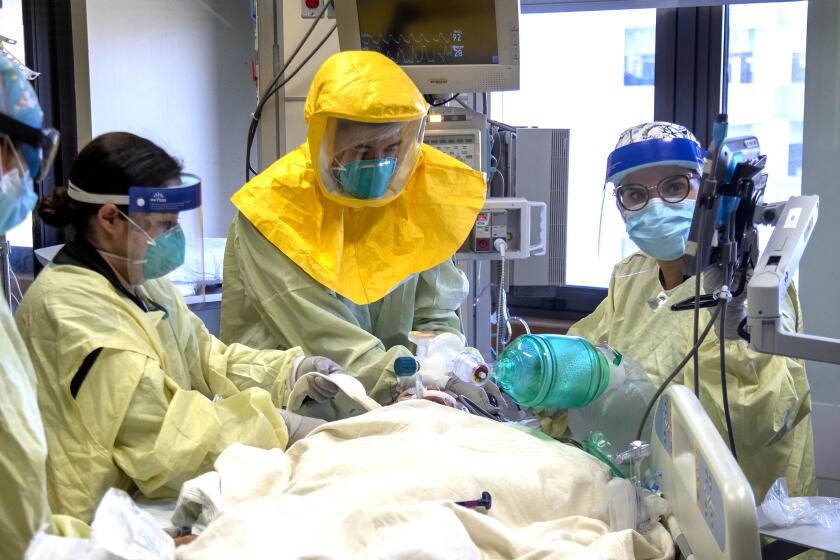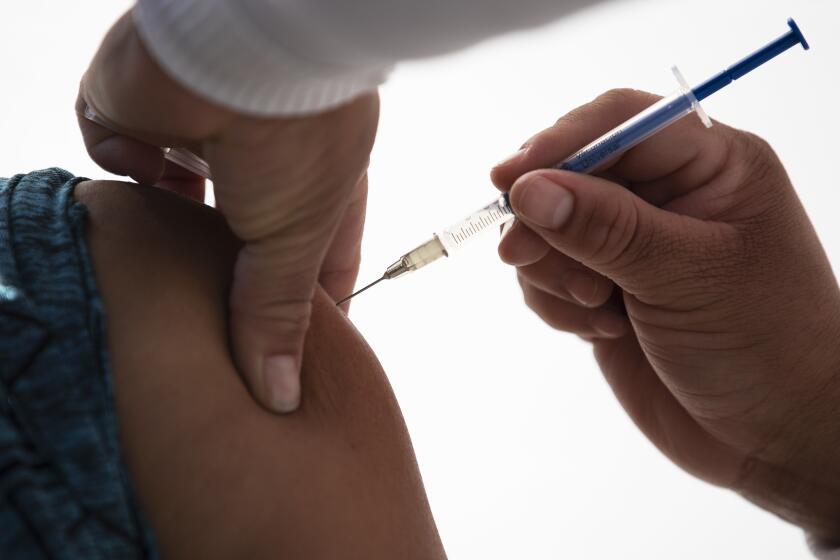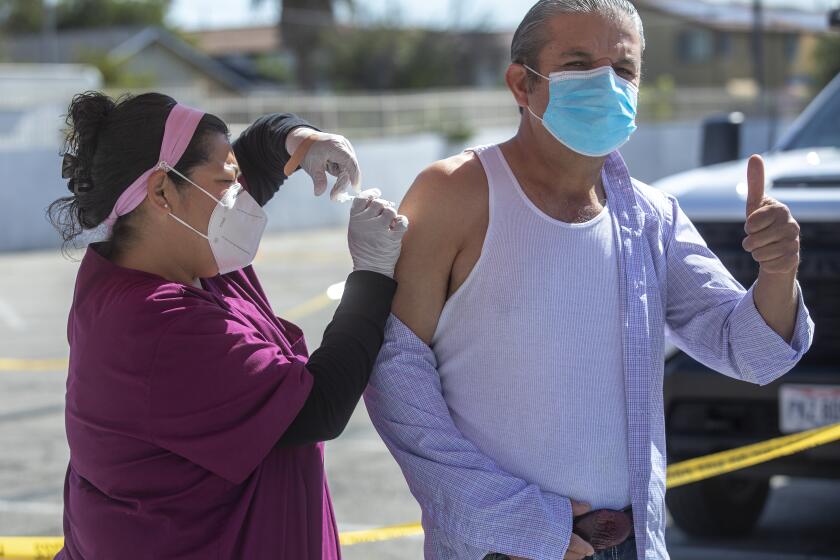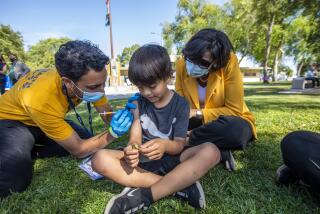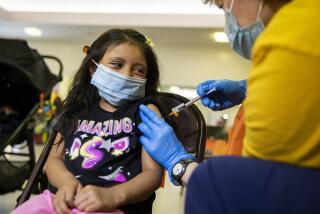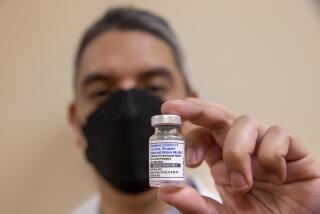COVID-19 vaccines for children and teens are coming, experts say
- Share via
As adults in the United States continue to line up for their COVID-19 vaccines, children and teens have largely been kept out of the queue. That could soon change.
The nation’s top infectious diseases expert says that by fall, he expects to have data showing that children and teens age 12 to 17 can start rolling up their sleeves for COVID-19 shots. Younger children could follow in the first quarter of 2022.
“We project that high school students will very likely be able to be vaccinated by the fall term — maybe not the very first day, but certainly in the early part of the fall for that fall educational term,” Dr. Anthony Fauci said Sunday on CBS’s “Face the Nation.”
Children appear to have largely been spared the worst ravages of COVID-19, often suffering mild or minimal symptoms. And student vaccinations are not needed for safe school reopenings, experts say. Still, a wide-scale vaccination of America’s children and teens could offer some peace of mind to families — and would provide welcome aid in the effort to achieve herd immunity against the coronavirus.
“When you get the overwhelming majority of the population vaccinated, the level of virus in the community gets so low that the risk of infection is going to be minuscule,” Fauci said this week during a virtual event held by Tufts University.
Currently, no COVID-19 vaccine is authorized for use in children under the age of 16. But several vaccine makers are already testing their shots in younger teens and some pre-teens, and others have committed to doing so soon.
It’s all part of a push to get as many Americans protected against the virus as possible. And it can’t come fast enough for many doctors.
The American Academy of Pediatrics issued a call late last year for manufacturers to include children in their clinical trials because there’s no other way to judge whether the vaccines are safe and effective for them.
“If we do not add children to these research trials very soon, there will be a significant delay in when children are able to access potentially life-saving vaccines. This is unconscionable,” Dr. Sara “Sally” H. Goza, the academy’s president at the time, said in a statement late last year.
Children who spread coronavirus to their parents and grandparents are apologizing to them on their deathbeds as L.A. County reels.
It’s true that children appear to be far less impacted than adults, particularly the elderly. Despite accounting for 22% of the U.S. population, as of March 9, children under 18 made up 11.6% of nearly 22 million cases, and less than 0.2% of nearly 383,000 COVID-19 deaths, according to the Centers for Disease Control and Prevention. (The U.S. has more than 29 million cases and more than 527,000 deaths, according to current Johns Hopkins University data.)
But that still amounts to a lot of needless suffering and tragedy, said Dr. Robert Frenck, a pediatric infectious disease specialist at Cincinnati Children’s Hospital Medical Center. Data from the CDC show that 428,502 children ages 4 and under have been sickened with COVID-19 since the start of the pandemic, and 94 of them have died. Another 2,078,245 kids between the ages of 5 and 17 have had COVID-19, and 194 have died.
“These are ... healthy kids that should have had a normal life ahead of them, and COVID changed that,” Frenck said.
Writing in the journal Clinical Infectious Diseases, several doctors made the case that vaccinating children was a critical move in the fight against the pandemic — not to mention crucial to protect youth against unnecessary suffering and risk of death.
“The direct COVID-19 impact upon children is greater than that observed for a number of other pathogens for which we now have effective pediatric vaccines,” they wrote. “Additionally, the role of children in SARS-CoV-2 transmission has clearly been underappreciated.”
The researchers pointed to several studies that suggest children may be effective transmitters of the virus. Among them: a number of studies comparing virus levels in the respiratory tract of children to that in adults; and a CDC study of a Georgia summer camp where 44% of the 597 attendees, trainees and staffers were infected.
There’s little data to guide women who are pregnant, or trying to become pregnant, about whether to take a COVID-19 vaccine. Here’s what to consider.
Frenck was one of the authors of that editorial. He pointed out that there are roughly 75 million people under 18 years of age, and we’ll have a hard time achieving herd immunity without them.
“If you didn’t vaccinate that group you’re going to have a large part of the population that’s not vaccinated,” he said in an interview.
Vaccine makers won’t have to start entirely from scratch when they test their wares in children, because they’ll have the vaccines’ demonstrated safety and efficacy in adults as a starting point.
To begin, companies will start with teenagers, whose responses to the vaccine are expected to be the most like what’s been observed in young adults. Then they’ll work their way into younger and younger cohorts, all the way down to infants, said Dr. Yvonne Maldonado, a pediatric infectious disease vaccinologist at Stanford University.
Pfizer, which included 16- and 17-year-olds in its Phase 3 clinical trial, has now fully enrolled its trial for 12- to 15-year-olds. Younger age groups would follow.
Fauci said in a briefing last month that vaccine trials for 12-year-olds down to 5- to 6-year-olds would likely start around April, though it would likely take a year for results to come in.
“That’s how we do all vaccine trials,” Maldonado said. “We always start with adults and then we work into children.”
While researchers aren’t expecting any big surprises when it comes to the vaccine’s safety and efficacy in children, the data need to be gathered.
“Sometimes children respond the same to vaccines as adults do but sometimes they don’t,” Maldonado said. “It’s very different for each organism, each type of disease, each vaccine — so there’s no one answer to that question, and that’s why you have to do a trial each time.”
Americans are warming up to COVID-19 vaccines, with 19% saying they’ve already received at least one dose and 49% intending to do so when they get the chance.
The COVID-19 vaccines from Moderna and Johnson & Johnson were only tested in adults; as such, they’re only authorized for use in those age 18 and up. Like Pfizer, Moderna has begun testing its vaccine in minors, while Johnson & Johnson has committed to doing so in the first half of 2021. (So has AstraZeneca, though its vaccine has not yet been authorized for use in any age group in the U.S.)
Dr. Richard Malley, a pediatric infectious disease specialist at Boston Children’s Hospital, said the trials in minors will be looking at whether the vaccines are able to induce an immune response. Essentially, investigators will vaccinate half their minors and give the other half a placebo and then, weeks later, test their blood for the presence of coronavirus antibodies. Those results will be compared to the antibody levels seen in adults.
That’s a little different from the way clinical trials are done in adults, where tens of thousands of participants were administered either vaccines or placebos and researchers simply watched and waited to see how many cases of COVID-19 emerged in each group. (The vaccines were deemed effective because the people who got them were far less likely to become ill than the people who got the placebos.)
But it would take a long time to recruit enough children for that type of a trial and then wait for enough COVID-19 cases to draw conclusions about its efficacy, Malley said. So-called immunogenicity trials are much more time-efficient, partly because they’re based on the idea that if vaccinated children produce antibodies at roughly the same level seen in vaccinated adults’ blood, it’s reasonable to assume that children would have about the same level of protection.
“That’s a bit of a leap of faith,” Malley said, “but it’s a reasonable one.”
